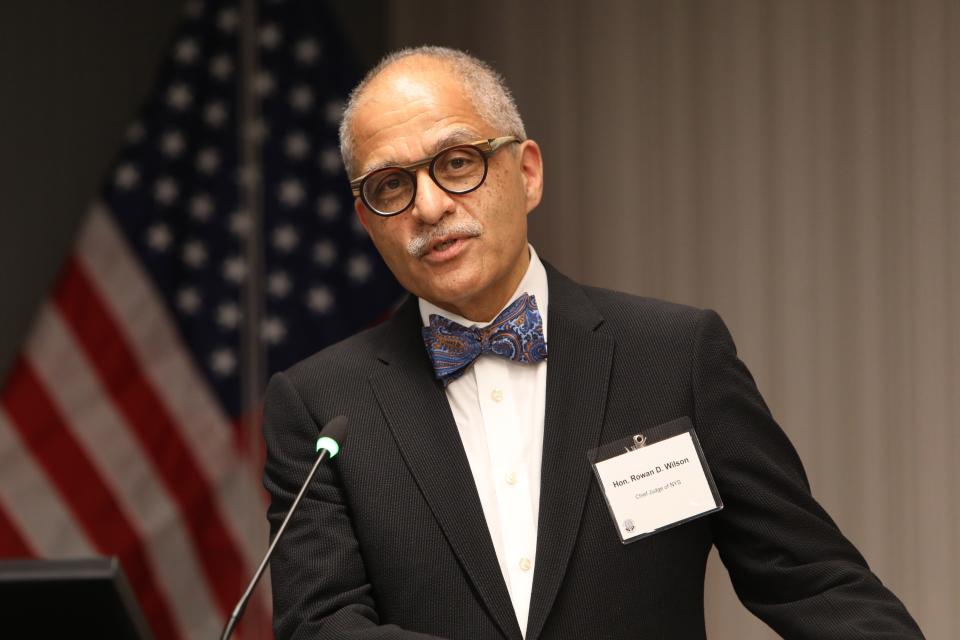NY’s top judge explains recusal from Trump gag order case. What this means for verdict
The chief judge on New York’s top court said Thursday that technical and ethical reasons militated his recusal from Donald Trump’s appeal of the gag order in his hush money trial.
In a brief aside at a function hosted by the Westchester Legal Aid Society, Chief Judge Rowan Wilson explained that one of the parties in that appeal, Justice Juan Merchan, was represented by the state Office of Court Administration. Because Wilson, as chief judge, oversees that office, he believed it was necessary to recuse himself from the appeal.
Ordinarily, the New York Attorney General’s Office represents judges who are themselves parties to lawsuits in their official capacity, he said.
“For reasons I don’t know, the Attorney General didn’t represent Justice Merchan, and instead, then, a lawyer within the Office of Court Administration represented him,” Wilson commented. “That didn’t seem appropriate to me to remain on that case.”
It was “entirely my decision,” he said. “This is more of an appearance of impropriety issue.”
Court of Appeals rejected Trump's attempt to appeal gag order automatically
In a summary order Tuesday, the Court of Appeals, New York’s highest court, rejected Trump’s attempt to appeal his gag order automatically. The court, minus Wilson and Judge Caitlin Halligan, determined that there were “no substantial constitutional” issues involved.
Merchan had issued the gag order ahead of Trump’s hush money trial. It prevents Trump from commenting on witnesses, court staff and jurors.
Last month, Trump was convicted of 34 counts of falsifying business records. His sentencing is scheduled for July 11.
Trump may still obtain the top court’s permission to appeal his gag order if two of the court’s seven judges agree his appeal should be heard. But this course of appeal is purely discretionary, and the court accepts only a small fraction of cases under this pathway.
In 2023, the Court of Appeals accepted fewer than 7% of cases under its discretionary authority, according to annual statistics published by the court.
Wilson and Halligan have now both recused themselves from the gag-order appeal, limiting the pool to only five judges who would decide whether to accept it for consideration.
Why are the circumstances of the appeal and the recusal unusual?
The circumstances giving way to Trump’s appeal, and Wilson’s recusal, are themselves unusual. His attorneys pursued a rare pathway where litigants can sue judges directly in order to prevent them from exceeding their judicial authority.
Normally, judges are not named as individual parties in appeals of their decisions.
But the question of Wilson’s recusal is not an academic exercise. It may bear directly on the outcome of Trump’s criminal case.
Wilson is one of the court’s most liberal judges, and he is an outspoken supporter of the rights of criminal defendants.
He was elevated in 2017 to the high court by Gov. Andrew Cuomo, and then tapped for the chief judge’s slot by Gov. Kathy Hochul after her first pick, Hector LaSalle, was deemed insufficiently progressive.
In April, Wilson was one of four judges who overturned Harvey Weinstein’s rape and sexual abuse convictions.
That 4-3 ruling was fiercely contested, pitting the court’s more conservative judges against some of its most progressive jurists.

What does this mean for the verdict?
Whether Wilson will have cause to recuse himself when Trump appeals the actual verdict in his case is unclear, given the unusual way his gag-order appeal was brought.
But losing Wilson, a bulwark for criminal defendants and indigent litigants, could be enough to swing the case.
Arguments that are sure to feature in Trump’s appeal — regarding evidence of past misconduct that was allowed to be introduced — were central to the court’s decision to overturn Weinstein’s conviction.
As to whether the Office of Court Administration would have any role in the appeal of Trump’s verdict, Wilson suggested not.
“No OCA (Office of Court Administration) lawyer has been involved in the regular criminal case,” he said. “Absent some other reason that I don’t know about, I would expect that I would participate.”
Asher Stockler is a reporter for The Journal News and the USA Today Network New York. You can send him an email at astockler@lohud.com. Reach him securely: asher.stockler@protonmail.com.
This article originally appeared on Rockland/Westchester Journal News: What top judge’s recusal from Trump gag order case mean for verdict


